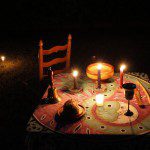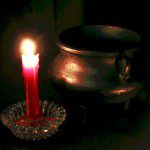 Last week’s post on animal sacrifice generated an unusual amount of comments. Most of them were – as requested – polite, respectful, and on-topic. A few carried some unstated but very significant assumptions, and I’d like to use one of them to explore an important theological question: how do we know what we know about the Gods?
Last week’s post on animal sacrifice generated an unusual amount of comments. Most of them were – as requested – polite, respectful, and on-topic. A few carried some unstated but very significant assumptions, and I’d like to use one of them to explore an important theological question: how do we know what we know about the Gods?
Here’s the comment:
Unless a “God” were to come on down and materialize before me and tell me face to face that they want such and such a sacrifice, I tend to believe that these feelings or callings, despite whatever ‘signs’ I may be observing, are nothing more than my own interpretation of what I think they want from me and not a direct order/request from the divine.
The first key assumption here is the primacy of physical evidence. This is mostly a good thing – our lives are longer, easier, and more secure than the lives of our ancient ancestors in large part because humans have learned to observe physical evidence and draw reasonable conclusions from it. We do ourselves and our religions no favors when we ignore the results of science, or when we claim science “proves” some aspect of our religious beliefs when in fact it does not. So far so good.
But in the absence of physical evidence, the commenter assumes people who hear calls from the Gods are simply hearing what they want to hear. Now, we know this happens. Progressive Christian Anne Lamott said “you can safely assume that you’ve created God in your own image when it turns out that God hates all the same people you do.” We would be quite naïve to assume Pagans aren’t at least occasionally guilty of this same error.
The problem is that this argument strongly implies that the material world is the only world there is, or at least the only world that can affect us. It leaves no room for the world of spirit or for the world of Gods and ancestors. It leaves no room for spiritual, mystical, and religious experiences, experiences that have been meaningful and helpful to people all over the world for at least as long as we’ve been human and that continue to this day.
Those who believe there is only the material world are, of course, free to do so. But to insist everyone must believe this, or even that those who do not are somehow mentally ill (as has been charged in this debate), is at odds with thousands of years of human experience and thought – not to mention incredibly arrogant.
Still, unquestioning belief is not a Pagan virtue, and the question “how do we know?” is not only fair and reasonable, it’s a necessary question as we begin to develop robust Pagan theology.
We know what our ancestors left us. We know the Gods they worshipped. We know a thing or two about how they worshipped Them. We know some of their stories about the Gods. No, we don’t know everything. But we know enough to say certain beliefs and practices were meaningful and helpful to them, and therefore worthy of our consideration.
We need not do everything our ancestors did. We are 21st century Westerners, not classical Greeks or pre-Roman Celts – our religion must speak to our circumstances here and now. But neither should we dismiss a practice simply because it’s no longer reflected in our mainstream culture.
We know what we’ve experienced. I’ve experienced the presence of Gods, ancestors, and nature spirits. Some of those experiences have been subtle, but others have been as strong as a wild stag. I’ve received messages that were as clear and unambiguous as any human conversation. I can’t tell you with absolute certainty what these experiences are. All I can do with certainty is to describe the practices that brought them about. If you follow these practices, you may have similar experiences. Or you may not – Gods have agency of Their own and They will do what They will do.
That we would like to have absolute certainty does not mean we can have it. That some religions claim to have certainty does not mean they actually do. To assume that because we can’t be certain about the interpretation of religious experiences means we should interpret them in only materialistic, non-theistic ways is binary thinking of the worst sort.
We know what others have experienced. The pressure to conform to mainstream beliefs and practices is strong. If I was the only person having these experiences I would have even more doubts about them than I already do. But I’m not the only one.
Read Pagan and polytheist blogs. Talk to priests, shamans, hedgewitches, and other practitioners. Read their books. I do this and I see lots of other people who are having lots of experiences that while not identical are quite similar to my own.
“Consensus reality” is just that – the consensus opinion of the majority of people in a given culture. It may be right, and on many matters it probably is. It’s worth giving it our honest consideration. It’s not worth giving it our unquestioned acceptance. Some of us are forming a new consensus.
We know the outcome of following this path. Again, religion is an inherently uncertain matter, but that uncertainty does not mean all religions are equally valid. If your religion helps you deal with the difficulties of life, inspires you to live a meaningful and helpful life, and teaches you to respect the rights of others to do the same, then it’s a good religion.
If your religion encourages you to oppress others, to be satisfied with the status quo, or tells you it’s all about you, then it’s a bad religion.
This isn’t complicated, but based on the religious conflicts in the world, it is hard. Ultimately, which Gods you do or don’t worship and how you do or don’t worship Them is not important to me. How your religious beliefs and practices cause you to treat me and everyone else is very important to me.
All of the above. These different ways of knowing serve as checks and balances on each other. None of them are perfect or complete; all of them provide a piece of the puzzle but not the whole picture. Concentrate on only one and you get fundamentalist Christians who ignore mountains of physical evidence because it contradicts their holy book. Or you get Pagans who claim their mystical experience means Morrigan is a nurturing mother Goddess. Or you get intelligent, educated Westerners who insist polytheists couldn’t have possibly heard from a God who isn’t entirely in their heads.
Answering the question “how do we know?” requires looking at all these ways of knowing.
















